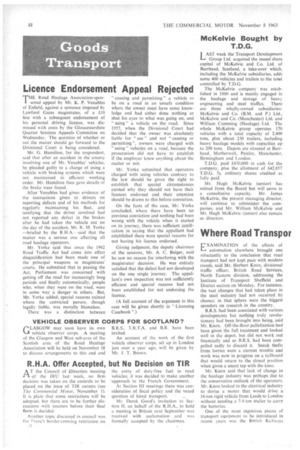Licence Endorsement Appeal Rejected
Page 52

If you've noticed an error in this article please click here to report it so we can fix it.
THE Road Haulage Association-spon sored appeal by Mr. K. P. Venables of Enfield, against a sentence imposed by .Lawford Gates magistrates, of a £10 fine with a subsequent endorsement of his personal driving licence, was dismissed with costs by the Gloucestershire Quarter Sessions Appeals Committee on Wednesday. The question of whether or not the matter should go forward to the Divisional Court is being considered.
Mr. G. Hamilton, for the respondent, said that after an accident in the county involving one of Mr. Venables' vehicles, he pleaded guilty to a charge of using a vehicle with braking systems which were not maintained in efficient working order. Mr. Hamilton then gave details of the brake wear found.
After Venables had given evidence of the instructions given to drivers on reporting defects and of his methods for regularly maintaining his fleet, and testifying that the driver involved had not reported any defect in the brakes after he had taken the vehicle out on the day of the accident, Mr. R. M. Yorke —briefed by the R.H.A.—.said that the matter was a serious one affecting all road haulage operators.
Mr. Yorke said that since the 1962 Road Traffic Act had come into effect disqualification had been made one of the principal weapons in magistrates' courts. He submitted that in passing the Act. Parliament was concerned with getting off the road for increasingly long periods and finally automatically, people who, when they were on the road, were in some way a danger to others. But, Mr. Yorke added, special reasons existed where the convicted person, though legally liable, was morally blameless.
There was a distinction between
" causing and permitting" a vehicle 10 be on a road in an unsafe condition where the owner must have some knowledge and had either done nothing or shut his eyes to what was going on, and " using " a vehicle on the road. Since 1957, when the Divisional Court had decided that the owner was absolutely liable for " use " and not "causing or permitting", owners were charged with " using " vehicles on a road, because the prosecution did not have to establish if the employer knew anything about the matter or not.
Mr. Yorke submitted that operators charged with using vehicles contrary to the law should be given the right to establish that special circumstances existed why they should not have their licences endorsed and their attention should be drawn to this before conviction.
On the facts of the case, Mr. Yorke concluded, where there have been no previous conviction and nothing had been wrong with the vehicle when it started on its journey, there was sufficient justification in saying that the appellant had established there were special reasons for not having his licence endorsed.
Giving judgment, the deputy chairman of the sessions, Mr. A. C. Bulger, said he saw no reason for interfering with the magistrates' decision. He was entirely satisfied that the defect had not developed on the one single journey. The appellant's own inspection was not sufficiently efficient and special reasons had not been established for not endorsing the licence.
(A full account of the argument in this case will be given shortly in "Licensing Casebook ".)














































































































































































































































